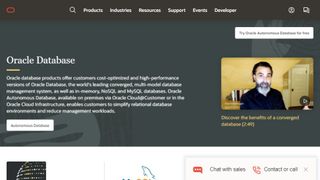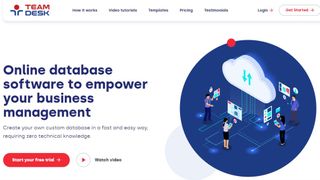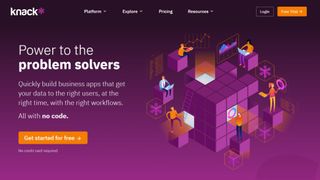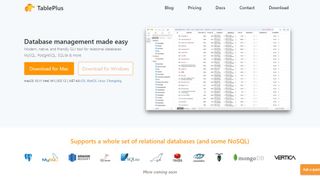Best database software of 2024
The best database software for building relational and non-relational databases
The best database software makes it simple and easy to build your own databases or manage existing ones.

1. Best for management
2. Best cloud DBaaS
3. Best customizable
4. Best for ease-of-use
5. Best for Mac
6. FAQs
7. How we test
There are many different options, all of which allow for the retrieval of datasets in different ways. And there are many different priorities that may affect the database architecture, whether it's query speed, storage format, security or even integration issues.
Many people will be familiar with the basic set of columns and rows of a simple database, such as one made with Microsoft Access, but these days databases can be multi-layered, use different query languages, and work with different storage formats such as XML.
Of course, you can design your own database, and there are various text editors and IDE's available for coding your applications to run them.
And major database software such as MySQL Community Server is now open source software. With all that in mind, we’re going to look at some of the powerhouses of the database world, from simple and straightforward solutions, to ones with more complex architecture that may require extensive customization.
To assess what areas they perform well in, we compared these database software across numerous aspects. We looked at their performance, scalability, interface, security, and automation features. We also looked at their pricing, customer support, configurability, and the quality of tools they offer, among other aspects.
We've also listed the best SQL online courses.
The best database software of 2024 in full:
Why you can trust TechRadar
Best for management

Reasons to buy
Reasons to avoid
Microsoft Azure offers a wide range of database software and management options, hardly surprising as Microsoft has been a leading developer of database formats for decades.
While home users may (or may not!) be familiar with Microsoft Access, which comes as part of the Microsoft Office suite of apps, MySQL has been one of Microsoft's most valuable gifts to the open source community.
Although MySQL is increasingly in competition with other database types, not least PostgreSQL and non-relational databases such as NoSQL, Microsoft can cater for these and more with its cloud-based Azure offering.
The Microsoft Azure platform is already an industry leading service, but databases and database management remain core to that. And while some users may feel overwhelmed by the many options in Azure, the one that allows databases to be fully managed can provide some relief.
Pricing is dependent upon the actual Azure services being subscribed to, but estimates are available allow with introductory offers to help ease new users into the Azure ecosystem.
Read our full Microsoft Azure review.
Best cloud DBaaS

2. Oracle Database
Reasons to buy
Reasons to avoid
The Oracle Database offers a database as a service (DBaaS) platform that runs in the cloud, and features at the heart of Oracle's cloud service provision. It aims to provide a wide range of benefits for enterprises and database administrators alike.
For a start, it aims to provide improved agility and innovation, offer faster time to market, while reducing risks and lowering costs over traditional on-premises databases. It's also designed to withstand hardware failure and offers a full-stack of patching software, firmware, clustering, and virtualization. Performance and capacity can be easily scaled as and when needed.
The use of artificial intelligence (AI) and machine learning (ML) means that many routine functions can be automated, reducing workload stress for database administrators and allowing them to focus on more high-value tasks.
Better still, Oracle provide an "always free" tier with their cloud services, which includes the use of two Oracle Autonomous Databases, as well as access to tools such as Oracle Application Express (APEX) and Oracle SQL Developer.
Best customizable

3. TeamDesk
Reasons to buy
Reasons to avoid
If you’re looking for a powerful database solution that’s also easy to use, then it’s worth checking out TeamDesk. It provides you with the tools to create custom databases quickly without any prior technical knowledge.
What’s great about TeamDesk is that it runs on the cloud through its own secure servers, so you don’t need to invest in your own hardware. According to the company, it’s achieved a 99.96% uptime record over the past six years, making it a reliable choice.
The software runs on PC, Mac, iPhone, Android and Windows Phone. To set up a database, you can either choose from a library of predefined templates or build your own from scratch. Once you’ve done that, you’re able to remove and add functionalities as your business grows.
In terms of pricing, there are several plans available. The starter package lets you add up to five users with an unlimited amount of tables, records, storage space and customer support. However, there’s a team edition available and an enterprise edition as well. At any rate, you can sign up for a 14-day free trial to test the waters.
Best for ease-of-use

4. Knack
Reasons to buy
Reasons to avoid
Targeted at organizations of all sizes, Knack is probably one of the most diverse and easy-to-use database management solutions out there. The cloud-based platform is used by thousands of businesses across the world, including Fortune 500 companies, startups, educational institutions and charities.
It offers a range of tools that aim to transform the way you organize business data. You can structure it based on metrics such as names and emails, link records together, and gain a better insight into your data by using a range of formulas and equations. What’s more, the interface is easy-to-use and requires no coding knowledge.
To get real-time data insights, you can set up dashboards kitted out with charts, graphs and pivot tables. You can also conduct searches across datasets and make use of flexible filters. And just like TeamDesk, there’s a variety of pre-built templates available, meaning you can set up advanced databases quickly.
The software comes with some neat e-commerce abilities, too. You’re able to process payments, donations and online orders through integration with payment providers such as PayPal and Stripe. There’s a 14-day free trial available.
Best for Mac

5. TablePlus
Reasons to buy
Reasons to avoid
Looking for an on-premise database management platform? Then look no further than TablePlus. Available for the Mac and Windows, it lets you create and manage a plethora of relational databases from one user interface, including the likes of MySQL, SQLite, Redis, Amazon Redshift and Postgres.
It lets you create, query, edit and save databases easily from a native app that’s fast and easy-to-use. However, one of the defining features of this software is that it comes with native TLS encryption to ensure that important business data never gets into the wrong hands.
As for other features, there are multi-tab and multi-window modes so you can get a quick overview of various datasets. And you can track changes you’ve made to your databases through a function called Code Review. You can also split databases into tabs and highlight different datasets to increase productivity.
This software is used by major companies and organizations such as Spotify, Apple, Intel, FastMail, Stanford University, Shutterstock, and Rocket Internet.
We've also highlighted the best laptops for programming, and the best Linux distros for developers.
Database software FAQs
What is database software?
Database software is a tool for the creation, modification, and maintenance of database files and records that are hosted in the cloud or on servers.
Along with managing data storage and reporting, database software programs can help with bolstering security and ensuring swift file creation.
How to choose the best database software for you?
When choosing the best database software for your business, start by considering your budget and the software's operation and maintenance price.
You'll want to assess your work needs, like how many users you expect to handle. What programming languages do you want to use? Do you need multiple database formats?
Evaluate how reliable the program's alerting system is and whether there's an active support system and solid backup support. Depending on your team's capabilities, you'll want to pick a database software that can be configured without much hassle.
You'll also want to check whether it offers the performance you require (like latency and storage), how scalable it is, both horizontally and vertically, and the quality of security.
The best database software: How we test
We've evaluated the best database software across various points, from their interface and uptime to the operating systems they run on and the efficacy of the automation features.
We assessed their pricing plans, configurability, benefits for database administrators, and scalability. We also considered their security and encryption features, customer support, and additional features like e-commerce integration and real-time data insights, among other things.
Read more on how we test, rate, and review products on TechRadar.
Get in touch
- Want to find out about commercial or marketing opportunities? Click here
- Out of date info, errors, complaints or broken links? Give us a nudge
- Got a suggestion for a product or service provider? Message us directly
- You've reached the end of the page. Jump back up to the top ^
Are you a pro? Subscribe to our newsletter
Sign up to the TechRadar Pro newsletter to get all the top news, opinion, features and guidance your business needs to succeed!
Nicholas Fearn is a freelance technology journalist and copywriter from the Welsh valleys. His work has appeared in publications such as the FT, the Independent, the Daily Telegraph, The Next Web, T3, Android Central, Computer Weekly, and many others. He also happens to be a diehard Mariah Carey fan!
